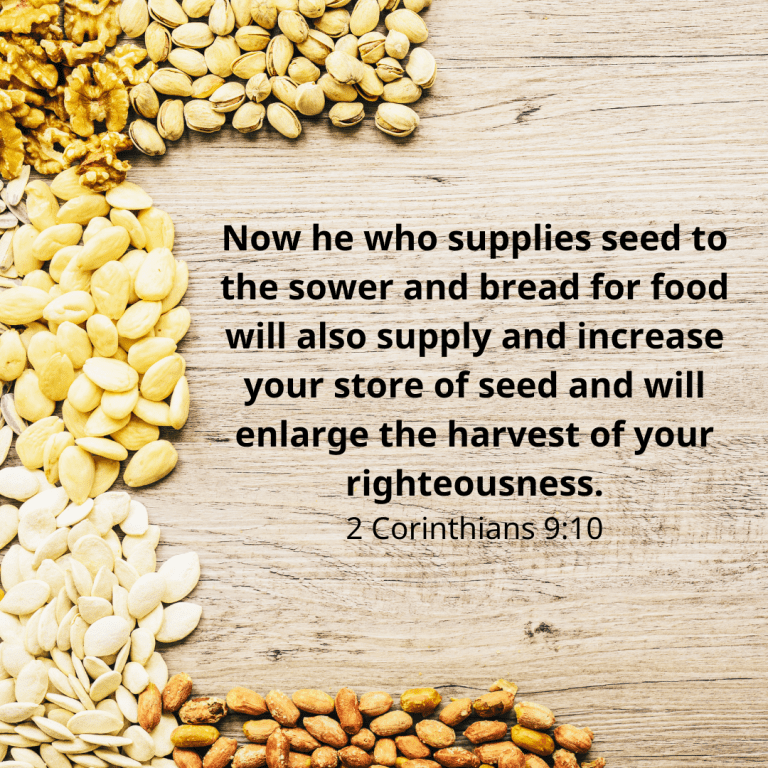In a world that often values splendour and abundance, the Bible reminds us that even the smallest gifts can have a profound impact. God’s kingdom operates differently from the world’s standards, showing us that it is not the size of the gift that matters, but the heart behind it. Here are seven Bible verses that illustrate the transformative power of small yet significant acts of giving.
1. The Widow’s Offering
“Truly I tell you, this poor widow has put more into the treasury than all the others. They all gave out of their wealth; but she, out of her poverty, put in everything—all she had to live on.” (Mark 12:43-44)
The widow’s two small coins seemed insignificant compared to the large sums others gave, yet Jesus celebrated her gift because it came from her heart and her trust in God. Despite her poverty, she gave all she had, demonstrating an unwavering faith in God’s provision. This story teaches us that the value of a gift is not measured by its size but by the sacrifice and faith it represents. Her act challenges us to consider what we’re willing to give, even when it feels like we have little to offer.
2. The Boy with Loaves and Fish
“Here is a boy with five small barley loaves and two small fish, but how far will they go among so many?” (John 6:9)
A young boy offered his small and inadequate lunch to Jesus, and it became the catalyst for one of the greatest miracles, feeding over five thousand people. His offering was small and ordinary, yet in Jesus’ hands, it became extraordinary. This story reminds us that God can take what little we have and multiply it beyond our imagination when we give with an open heart. The boy’s willingness to share what he had shows us the importance of trusting God to use our contributions for His glory.
3. A Cup of Water
“And if anyone gives even a cup of cold water to one of these little ones who is my disciple, truly I tell you, that person will certainly not lose their reward.” (Matthew 10:42)
A simple act of kindness, like offering water, does not go unnoticed in God’s eyes. Jesus emphasizes that even the smallest gesture, done with love and for His sake, carries eternal significance. Small gestures of kindness can make a significant difference in someone’s life and are cherished by God. This verse inspires us to recognize the value of everyday acts of kindness and how they reflect God’s love to those around us.
4. Faith as Small as a Mustard Seed
“If you have faith as small as a mustard seed, you can say to this mountain, ‘Move from here to there,’ and it will move. Nothing will be impossible for you.” (Matthew 17:20)
This verse reminds us that even the smallest contributions, when paired with faith, can achieve monumental results. Just as a mustard seed grows into a mighty tree, small acts of giving can create ripples of change. It’s not about the magnitude of what we bring, but the faith with which we bring it. When we trust God, even the smallest step can lead to extraordinary outcomes.
5. The Generosity of the Macedonians
“Out of the most severe trial, their overflowing joy and their extreme poverty welled up in rich generosity.” (2 Corinthians 8:2)
The Macedonian believers gave generously despite their poverty, demonstrating that generosity is not about wealth but about a willing heart. Their joy in giving came not from abundance but from their love for God and others. They saw giving as a privilege rather than a burden. Their example encourages us to give cheerfully, no matter our circumstances, trusting that our contributions, however small, can make a meaningful difference.
6. The Woman Who Anointed Jesus
“She did what she could. She poured perfume on my body beforehand to prepare for my burial.” (Mark 14:8)
The woman who anointed Jesus with perfume gave what she had, and her act of devotion was celebrated by Jesus. Though her gift may have seemed small in the world’s eyes, it carried eternal significance. Her act of love and sacrifice demonstrates that giving is not always about meeting physical needs but can also be an expression of worship and honor. This story challenges us to consider how our gifts reflect our love for Christ.
7. The Power of Partnership
“For I testify that they gave as much as they were able, and even beyond their ability. Entirely on their own, they urgently pleaded with us for the privilege of sharing in this service to the Lord’s people.” (2 Corinthians 8:3-4)
This verse highlights the collective power of small contributions. The Macedonians gave beyond their ability, showing that sacrificial giving often comes from a deep desire to serve. When we come together to give, even small gifts can combine to create a big impact, supporting God’s work in powerful ways. Their story reminds us that generosity is not limited by our resources but by the willingness of our hearts.
Conclusion
The Bible teaches us that small gifts, when given with a pure heart and faith, can have a big impact. Whether it’s a widow’s coins, a boy’s lunch, or a cup of water, God sees and honors every act of generosity. These stories remind us that in God’s hands, no gift is too small. This Christmas, let’s be inspired to give what we have—no matter how small—and trust that God will use it for His glory and the good of others. Even the smallest gift can be a seed for miracles in God’s hands.

The season of harvest is a time of gratitude, reflection, and abundance. For farmers, it signifies the end of a season of hard work, when crops are gathered, and the fruits of labor are celebrated. Spiritually, it reminds us of God’s faithfulness and the importance of sowing seeds of righteousness in our lives. The Bible speaks of harvest not just as an agricultural event but as a symbol of spiritual growth, provision, and God’s blessings.
Here are seven Bible verses that reflect the beauty, meaning, and significance of harvest time:
1. Galatians 6:9
“Let us not become weary in doing good, for at the proper time we will reap a harvest if we do not give up.”
Just as the harvest comes after a season of hard labor, our spiritual harvest will come if we remain steadfast in our efforts to live righteously. God’s timing is perfect, and we must trust that our diligence will bear fruit.
2. Matthew 9:37-38
“Then he said to his disciples, ‘The harvest is plentiful but the workers are few. Ask the Lord of the harvest, therefore, to send out workers into his harvest field.’”
Here, Jesus calls on us to be workers in this field, sharing the good news of salvation and helping to bring others into the kingdom of God. Harvest time is not just about receiving but also giving — sharing God’s love with the world.
3. Psalm 126:5-6
“Those who sow with tears will reap with songs of joy. Those who go out weeping, carrying seed to sow, will return with songs of joy, carrying sheaves with them.”
We may endure seasons of sorrow, but God promises that those who faithfully sow, even through hardship, will one day reap a harvest of joy. There is hope in the midst of trials, and the harvest will be a time of celebration.
4. Proverbs 10:5
“He who gathers crops in summer is a prudent son, but he who sleeps during harvest is a disgraceful son.”
Just as a farmer must be attentive during the harvest to gather his crops, we must be alert and ready to seize the spiritual opportunities that God places before us. Laziness and neglect lead to missed blessings, but diligence ensures that we reap the benefits of our labor.
5. 2 Corinthians 9:10
“Now he who supplies seed to the sower and bread for food will also supply and increase your store of seed and will enlarge the harvest of your righteousness.”
God is the provider of all things, and He ensures that those who sow will have what they need to reap a harvest. Not only does He provide materially, but He also increases the harvest of righteousness in our lives, enabling us to grow in character, faith, and good works. Our trust in God’s provision is important to experiencing His abundance.
6. James 3:18
“Peacemakers who sow in peace reap a harvest of righteousness.”
When we sow seeds of peace and righteousness, we reap a harvest of goodness and integrity. Just as the farmer carefully chooses what to plant, we must be mindful of the seeds we sow in our relationships and daily actions.
7. John 4:35
“Don’t you have a saying, ‘It’s still four months until harvest’? I tell you, open your eyes and look at the fields! They are ripe for harvest.”
The time for action is now, not later. The fields are ripe, and God is calling us to step into His work, sharing His love and truth with those who are ready to receive it. There is an urgency in the harvest, and we are called to respond.
Conclusion
Harvest time is a powerful reminder of God’s faithfulness and the spiritual principles of sowing and reaping. Whether we are harvesting crops or gathering the fruits of our spiritual labor, we are called to trust in God’s provision and timing. As we reflect on these Bible verses, may we be inspired to continue sowing seeds of righteousness, peace, and faithfulness, knowing that in due season, we will reap a bountiful harvest.

Here are a couple of reminders for you about loving one another. Be inspired to go out and spread love to those around you.
- 1 Corinthians 16:14 Let all that you do be done in love.
Love is at the very core of our faith. We shouldn’t love only at certain times. Everything we do should be done in love.
- John 13:34 A new commandment I give to you, that you love one another: just as I have loved you, you also are to love one another.
Jesus sets the example for us. He loves us, despite our flaws and shortcomings. We are also called to love one another.
- Romans 12:10 Love one another with brotherly affection. Outdo one another in showing honor.
Christians are brothers and sisters as adopted children of God. Therefore, we are to love one another like we love our family.
- Hebrews 10:24 And let us consider how to stir up one another to love and good works
You can set an example to people around you, by showing love. Inspire others to love and do good.
- Matthew 5:43-44 “You have heard that it was said, ‘You shall love your neighbor and hate your enemy.’ But I say to you, Love your enemies and pray for those who persecute you
Jesus tells us that we should not limit our love to those who love us, but even those who persecute us. To love and pray for our enemy or persecutor is a challenge in loving one another.
- Luke 6:31 And as you wish that others would do to you, do so to them.
Don’t wait for others to do good and show love. Express your love by doing good first.
- Matthew 22:39 And a second is like it: You shall love your neighbor as yourself.
The greatest commandment is to love God with all your heart and with all your soul and with all your mind. Jesus says that all the law and the prophets depend on these two.

Addictions come in many shapes and forms, whether it’s lust, alcohol, substances, gambling, gaming, or even excessive use of your mobile phone and social media. There is professional help to get as well as counselling from your priest or pastor.
Also, read the Bible and lay your addiction before God in prayer. Here are some passages from the Word of God to reflect upon.
- James 1:14-15 But each person is tempted when he is lured and enticed by his own desire. Then desire when it has conceived gives birth to sin, and sin when it is fully grown brings forth death.
We all have weaknesses within us that can make us fall and lead to an addiction. Acknowledging this, and admitting that you struggle with addiction is an important step to be free from it.
- 1 John 2:16 For all that is in the world—the desires of the flesh and the desires of the eyes and pride of life—is not from the Father but is from the world.
Addictions don’t come from God, but from the world and our desires, lusts and pride. We can rely on God wanting us to be free from any addiction.
- 1 Corinthians 10:13 No temptation has overtaken you that is not common to man. God is faithful, and he will not let you be tempted beyond your ability, but with the temptation he will also provide the way of escape, that you may be able to endure it.
You may feel that you can’t break your addiction. But the Bible tells us that God can. God will provide the way of escape. Turn to God, turn from your addiction. Let God fill you with his presence.
- 1 Corinthians 6:12 “All things are lawful for me,” but not all things are helpful. “All things are lawful for me,” but I will not be dominated by anything.
Addiction is many times when something takes control over you. Those things that are not helpful in your life and dominate your thoughts and desires you may need to cut out of your life.
- 1 Peter 2:11 Beloved, I urge you as sojourners and exiles to abstain from the passions of the flesh, which wage war against your soul.
Addictions come from this world and not from God. In the end, addictions replace God as the number one in our lives. It’s not just about addictions, but also about our souls.
- Matthew 6:13 And lead us not into temptation, but deliver us from evil.
Lay your struggles before God. Ask for God’s protection and deliverance.
- John 8:36 So if the Son sets you free, you will be free indeed.
This is the promise of Jesus Christ, that when he sets us free, it is real freedom.
This article is not intended as a replacement for medical or therapeutic help or treatment for addiction, but a complement and inspiration to those who battle addiction.

How does the Bible view women? At face value, some of its messages and examples can seem oppressive or devaluing. But when you learn more about how Jesus responded to the Bible’s historical and cultural context, you may rethink your first impressions. Christ entered into a specific time and culture that had assumptions very different from ours. How can understanding the biblical context inform our reading? How can the context help us to better understand who Jesus is—what he values, loves, and expects of his followers? Take a look, traveling all the way back to the culture Jesus entered.
How the Greeks Viewed Women
Let’s begin with the philosophers. Writers and thinkers often infuse a culture with certain beliefs—and this was especially so in the Greco-Roman world. When examined closely, some of their ideas may seem surprisingly antiquated to the modern reader.
For example, the revered philosopher Plato believed that women should be confined to the home while men tended to the business of state and commerce. Aristotle went even further, teaching that women were inferior to men, incapable of abstract thought, and emotionally volatile. Thus husbands and fathers were to rule over their wives and daughters. This thinking reflects the basic attitude toward women during the classical period.
How did these attitudes affect a woman’s life? The picture is not a pretty one. A young Greek girl is routinely married off to an older man. Her husband is free to take a concubine, and romantic love is not expected within marriage. Her role is to bear and raise children and run the household. She will rarely leave the house. Her education is limited to learning domestic tasks. She is not permitted to vote or hold property. Why would she be? As Euripides the playwright notes, “A woman is handicapped by intellect.” Thucydides helps him along by writing, “The name of a decent woman, like her person, should be shut up in the house.”
How the Jews Viewed Women
By Jesus’s time Greek ideas—including these ideas about women—had gradually crept into Jewish culture, despite Old Testament writings to the contrary. In the creation account in Genesis, God creates human beings as both male and female, giving them co-equal stewardship over the earth (Genesis 1:26-30). Throughout the Old Testament, women are given equal access to God’s law and held equally responsible to keep it.
The Old Testament record is replete with women whose great courage often surpasses that of the men around them. The stories of Miriam, Rahab, Ruth, Deborah, Hannah, Abigail, and Esther are prime examples of women whose insight and fortitude greatly influence the biblical narrative and the way God’s people understood themselves.
The Jewish understanding of women was so affected by exile, conquest, and trade that by Jesus’s time women were discouraged from studying Torah, God’s law, and encouraged to stay home to fulfill household duties. They attended synagogue assemblies seated separately from the men. The Greek-educated Jewish philosopher Philo, a contemporary of Jesus, saw women as having weak judgment and considered them unfit to learn the law. Some rabbis even went so far as to encourage men to limit their conversations with their own wives. What was the point of talking to someone with little knowledge of the law?
How Jesus Viewed Women
Into this distortion of God’s original intent for women comes a new teacher, the rabbi called Jesus of Nazareth. What do we know about Jesus’s relationships with women? Did he hold the same opinions as his culture? Let’s take a look at a few of his encounters with women.
Jesus speaks to a Samaritan woman in public (John 4:4-30)
Jesus shocks the woman at the well by asking her for a drink. Thus he steamrolls over cultural taboos against men speaking to women as well as Jewish prejudice against Samaritans. “You are a Jew and I am a Samaritan woman. How can you ask me for a drink?”
Jesus then reveals himself to her as the Messiah and the giver of the living water for which she longs.
Jesus teaches a woman one-on-one (Luke 10:38-42)
Women were not expected to study Torah, yet this renegade rabbi singles out one woman and opens Scripture to her. Mary “sat down at the feet of the Lord and listened to his teaching.” This position was that of the traditional rabbinic student.
When her sister complains about needing help, Jesus tells her that “Mary has chosen what is better, and it will not be taken away from her.”
Jesus comforts a widow and confronts death (Luke 7:11-17)
“Don’t cry,” Jesus says to a grieving widow whose son lies dead in his coffin. He touches the coffin, defying ceremonial law. Jaws drop in amazement as the young man sits up and begins to speak. Jesus gives the widow’s son back to her, alive and well.
Jesus touches an “unclean” woman (Luke 8:43-48)
Ceremonially unclean due to a chronic hemorrhage, a woman touches the hem of Jesus’ cloak. “Daughter,” Jesus speaks tenderly. “Your faith has healed you. Shalom.”
Jesus touches an infirm woman (Luke 13:10-16)
The religious leaders object to Jesus’s laying his healing hands on a crippled woman on the Sabbath.
“You hypocrites!” Jesus does not mince words. “Any one of you would untie your ox or your donkey from the stall and take it out to give it water on the Sabbath.Now here is this descendant of Abraham whom Satan has kept in bonds for eighteen years; should she not be released on the Sabbath?”
Jesus deals with a woman caught in adultery (John 8:1-11)
The woman’s accusers are silenced by Jesus’s words, “Whichever one of you has committed no sin may throw the first stone at her.” But he is gentle in his conversation with her.
Jesus allows Mary to anoint him (John 12:1-8)
When people are horrified at Mary’s extravagant outpouring of love, Jesus silences them all. Rather than rebuking her for touching him in this intimate way, he lavishes high praise on her. “Leave her alone; she’s anointing me for burial. This story will be told wherever the Gospel is preached.”
Jesus appears first to a woman after his Resurrection (John 20:11-18)
Although women were considered to be unreliable witnesses in court, Jesus assigns Mary Magdalene the task of being the first witness to the Resurrection.
Scripture’s Good News for Women
So what did Jesus really think of women? Did he touch them? Did he talk with them? Did he teach them? Did he give equal moral standing with men? Did he value them?
The record speaks for itself. First-century women in Palestine were second-class citizens. Sadly, some church leaders have still viewed and treated women in this way. But Jesus turned the tables on his culture, and his example calls us to do the same. Again and again, Jesus affirmed women’s value and dignity.
As the apostle Paul affirms in Galatians 3:26-28 (NIV): “So in Christ Jesus you are all children of God through faith, for all of you who were baptized into Christ have clothed yourselves with Christ. There is neither Jew nor Gentile, neither slave nor free, nor is there male and female, for you are all one in Christ Jesus.”

Once upon a time in the city of Harare, a group of young friends (Tanaka, Itai and Chido) gathered in the cozy living room of Tanaka’s house. They were determined to make a difference in their community during the upcoming season of giving. As they brainstormed ideas, they stumbled upon the concept of almsgiving—a practice rooted in the Bible that encourages selfless acts of charity.
Excitement filled the room as they envisioned a unique way to spread kindness. They decided to create the “Generosity Game,” a challenge that involved performing secret acts of kindness and giving, all inspired by the teachings of the Bible.
The friends drew inspiration from the Gospel of Matthew, where Jesus instructs his followers:
Matthew 6:3-4 (NIV): “But when you give to the needy, do not let your left hand know what your right hand is doing, so that your giving may be in secret. Then your Father, who sees what is done in secret, will reward you.”
The rules of the Generosity Game were simple: each friend would pick a random act of kindness to perform without revealing their identity. The game would last throughout the Lenten season, creating a ripple effect of generosity in their community.
The friends eagerly embraced the challenge, finding creative ways to give. Itai, inspired by the story of the Good Samaritan, anonymously left a care package on a neighbor’s doorstep where an old aged granny lived. Inside were basic toiletry items and a heartfelt note expressing care and compassion.
Luke 10:33-34 (NIV): “But a Samaritan, as he traveled, came where the man was; and when he saw him, he took pity on him. He went to him and bandaged his wounds, pouring on oil and wine. Then he put the man on his own donkey, brought him to an inn, and took care of him.”
Chido, recalling the miracle of the loaves and fishes, organized a food drive at her school, encouraging her classmates to contribute some food items to a local food bank and which were later distributed to the children living on the streets.
John 6:12 (NIV): “When they had all had enough to eat, he said to his disciples, ‘Gather the pieces that are left over. Let nothing be wasted.'”
As the days passed, the Generosity Game unfolded beautifully. The recipients of the acts of kindness were touched by the selfless gestures, and a spirit of community and compassion blossomed among the young friends.
On Easter Sunday, the friends gathered once more, reflecting on their experiences. Tanaka shared a Bible verse that had become their guiding light throughout the Generosity Game:
Proverbs 11:25 (NIV): “A generous person will prosper; whoever refreshes others will be refreshed.”
The Generosity Game not only impacted their community but also transformed the hearts of these young friends. They realised that almsgiving, inspired by the teachings of the Bible, was a powerful way to make a positive difference in the lives of others and to experience the true joy of giving.
Do you also want to be refreshed during this season? How about trying this Generosity Game by almsgiving whether by yourself or as a group.

Hearing the voice of God is a central theme throughout Scripture. From the gentle whisper to the thunderous proclamation, God’s voice guides, comforts, and instructs His people. Understanding how to hear His voice is crucial for anyone seeking to follow His will. Here are seven Bible verses that highlight the importance of hearing and recognizing God’s voice.
1. John 10:27 – “My sheep hear my voice, and I know them, and they follow me.”
Jesus uses the metaphor of sheep and a shepherd to describe the relationship between Himself and His followers. Just as sheep recognize and respond to the voice of their shepherd, believers are called to recognize and follow the voice of Jesus. Hearing God’s voice is not just about recognition, but also about obedience. When we truly hear Him, we follow where He leads.
2. 1 Kings 19:11-12 – “And after the earthquake a fire, but the Lord was not in the fire. And after the fire the sound of a low whisper.”
God’s voice is not always found in the loud and dramatic. Instead, He often speaks in a “low whisper” or “still small voice.” Be still and quiet your hearts, creating space to hear the subtle yet profound voice of God. It teaches us that God often communicates in ways that require us to listen carefully and attentively.
3. Isaiah 30:21 – “And your ears shall hear a word behind you, saying, ‘This is the way, walk in it,’ when you turn to the right or when you turn to the left.”
God provides guidance, even in the midst of uncertainty. As we navigate life’s decisions, God’s voice directs us, showing us the right path. This promise of divine guidance encourages us to trust that God will speak to us when we need direction, leading us on the path He has set before us.
4. Psalm 46:10 – “Be still, and know that I am God. I will be exalted among the nations, I will be exalted in the earth!”
In the busyness and noise of life, it can be challenging to discern God’s voice. However, by intentionally being still and acknowledging His sovereignty, we create an environment where we are more likely to hear Him speak. Stillness allows us to focus on God and tune in to His voice.
5. Hebrews 3:7-8 – “Therefore, as the Holy Spirit says, ‘Today, if you hear his voice, do not harden your hearts as in the rebellion, on the day of testing in the wilderness.’”
Hearing God’s voice requires not only listening but also being willing to act on what we hear. A hardened heart can prevent us from fully receiving God’s message and guidance. This verse calls us to be open and responsive to the Holy Spirit’s promptings.
6. Jeremiah 33:3 – “Call to me and I will answer you, and will tell you great and hidden things that you have not known.”
We are encouraged to seek God actively, knowing that He desires to reveal deep and profound truths to us. It emphasizes the relational aspect of hearing God’s voice, where we engage in dialogue with Him, confident that He will respond.
7. Revelation 3:20 – “Behold, I stand at the door and knock. If anyone hears my voice and opens the door, I will come in to him and eat with him, and he with me.”
Jesus stands at the door of our hearts, knocking and speaking. The invitation is clear: if we hear His voice and open the door, He will come in and fellowship with us. This verse highlights the personal and relational aspect of God’s communication, emphasizing that hearing His voice leads to deeper communion with Him.
Conclusion
Hearing the voice of God is a profound and essential part of the Christian life. These verses remind us that God speaks in various ways—sometimes in a whisper, sometimes in guidance, and always with a heart of love. To hear His voice, we must cultivate stillness, maintain a receptive heart, and be willing to respond in faith. As we do, we draw closer to God, following His lead and growing in our relationship with Him.

Hearing the Voice of God: 7 Bible Verses That Guide Us
Hearing the voice of God is a profound and essential part of the Christian life. These verses remind us that God speaks in various ways—sometimes in a whisper, sometimes in guidance, and always with a heart of love. To hear His voice, we must cultivate stillness, maintain a receptive heart, and be willing to respond in faith. As we do, we draw closer to God, following His lead and growing in our relationship with Him.

Hearing the voice of God is a profound and essential part of the Christian life. These verses remind us that God speaks in various ways—sometimes in a whisper, sometimes in guidance, and always with a heart of love. To hear His voice, we must cultivate stillness, maintain a receptive heart, and be willing to respond in faith. As we do, we draw closer to God, following His lead and growing in our relationship with Him.
